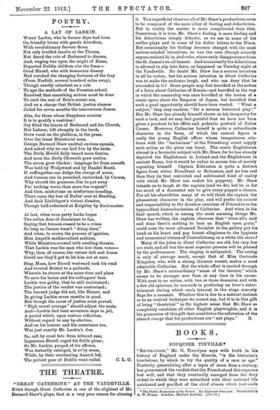POETRY.
A LAY OF LARKIN.
WHEN Larkin, who in former days had been On friendly terms with gentle Aberdeen, With revolutionary fervour flown Not only levelled insults at the Throne, But dared the rule of Redmond to disown, And, waging war upon the might of Rome, Deported Dublin children o'er the foam— Good Birrell, who with humorous dismay Had watched the changing fortunes of the fray (From Norfolk, several hundred miles away), Though overtly reluctant as a rule To ape the methods of the Prussian school, Resolved that something serious must be done To curb the zeal of Erin's errant son, And on a charge that British justice shames Jailed for seven months the temerarious James.
Alas, for those whose Sisyphean mission It is to gratify a coalition !
Joy filled the hearts of Redmond and his Church, But Labour, left abruptly in the lurch, Grew vocal on the platform, in the press, Over the latest Ministerial mess.
George Bernard Shaw emitted envious squeals, And asked why no one laid him by the heels.
The Daily Herald daily waxed more festive, And soon the Daily Chronicle grew restive.
The storm grew blacker: language far from smooth
Was held by Wedgwood and bir Handel Booth.
If suffragettes can dodge the charge of arson, And treason can be preached, unchecked, by Carson, Why should the generous Jim be put away For nothing worse than mere lese-majeste?
And then, misfortune on misfortune treading, There came the loss of Rufus' seat at Reading, And dark Linlithgow's virtual disaster, Though half-redeemed at Keighley by Buckmaster.
At last, when even party hacks began The sullen fires of discontent to fan, Saying that treason ceased to be a crime So long as Carson wasn't "doing time," And when, to crown the process of ignition, Miss Asquith mediaevalized sedition, While Ministers avowed with swelling throats, That Larkin was the man who lost them votes— Why, then, of course, the veriest dolt and dunce Could see they'd got to let him out at once.
Sing, Muse, how Birrell westward took his road And treated Bristol to a palinode, Wherein he strove at the same time and place To save his bacon and his colleagues' face. Larkin was guilty, that he still maintained ; The justice of the verdict was unstrained ; The learned judge did not, like Homer, nod In giving Larkin seven months in quod. But though the cause of justice must prevail, "High moral courage" should adjust the scale, And—Larkin had been seventeen days in jail, A period which, upon mature reflection, Without regard to any by-election, And on his honour and his conscience too, Was just exactly Mr. Larkin's due.
So, ref t by cruel fate from lettered ease, Ingenuous Birrell urged his futile pleas ; So Mr. Larkin, purged of his offence, Was instantly enlarged, in ev'ry sense, While, by their unrelenting Anarch led, The patient poor of Dublin went unfed. C. L. G.


















































 Previous page
Previous page